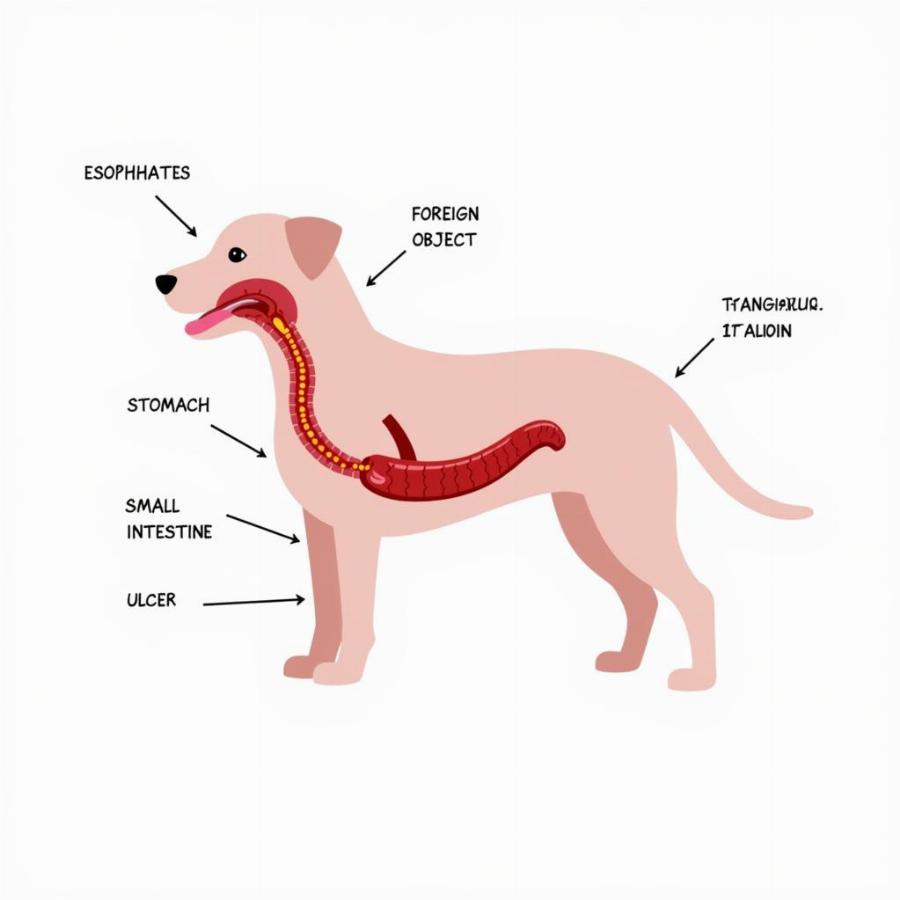Seeing your dog vomit blood can be a terrifying experience. It’s a clear indication that something is wrong and requires immediate attention. This article will explore the potential causes of dog blood vomit, also known as hematemesis, and guide you on the necessary steps to take. We’ll discuss the symptoms to watch for, diagnostic procedures, treatment options, and preventative measures. Understanding this critical issue can help you act quickly and potentially save your dog’s life.
Understanding Hematemesis in Dogs
Hematemesis can range from a small amount of blood mixed with vomit to a large volume of bright red blood. The color and consistency of the blood can provide clues about the underlying cause. Bright red blood usually indicates bleeding in the upper digestive tract (esophagus, stomach, or the beginning of the small intestine), while darker, coffee-ground-like blood suggests the blood has been partially digested, indicating a slower bleed or one originating higher in the digestive system.
It’s crucial to differentiate between hematemesis and the coughing up of blood (hemoptysis), which is often frothy. If your dog is coughing up blood, it could indicate a respiratory issue. However, in either case, immediate veterinary care is essential.
Common Causes of Dog Blood Vomit
Several conditions can lead to a dog vomiting blood, some more serious than others. These include:
- Ingestion of toxins: Rat poison, certain medications (like how much aspirin can i give my dog), and household chemicals can cause severe irritation and bleeding in the digestive tract.
- Gastrointestinal ulcers: These sores can develop in the stomach or intestines and bleed, leading to bloody vomit. Stress, certain medications like NSAIDs (movoflex for dogs should only be given as prescribed by a vet), and infections can contribute to ulcer formation.
- Foreign body obstruction: If a dog swallows a sharp object, it can damage the esophagus, stomach, or intestines, resulting in bleeding and dog vomit with blood.
- Inflammatory bowel disease (IBD): IBD causes chronic inflammation in the digestive tract, potentially leading to bleeding and bloody vomit.
- Cancer: Tumors in the digestive tract can also cause bleeding.
- Clotting disorders: These conditions prevent the blood from clotting properly, increasing the risk of bleeding.
 Causes of Hematemesis in Dogs
Causes of Hematemesis in Dogs
What to Do If Your Dog Vomits Blood
If you see your dog dog vomits blood, remain calm and take the following steps:
- Seek immediate veterinary attention. This is a medical emergency.
- Observe your dog closely. Note the frequency and volume of vomiting, the color of the blood, and any other accompanying symptoms.
- Do not induce vomiting unless instructed by a veterinarian.
- Bring a sample of the vomit to the vet, if possible. This can help with diagnosis.
Diagnosis and Treatment
Your veterinarian will perform a thorough physical examination and may recommend further diagnostic tests, such as blood work, urinalysis, fecal examination, X-rays, ultrasound, or endoscopy. Treatment will depend on the underlying cause of the why is my dog vomiting blood. It might include medications to control bleeding, reduce inflammation, or treat infections, as well as intravenous fluids to prevent dehydration. In some cases, surgery may be necessary to remove a foreign body or address other issues.
Preventing Dog Blood Vomit
While not all causes of dog blood vomit are preventable, you can take steps to minimize the risk:
- Keep toxic substances out of your dog’s reach. Store cleaning products, medications, and other potentially harmful substances securely.
- Provide a safe and stimulating environment. Reduce stress and anxiety, which can contribute to gastrointestinal issues.
- Feed a balanced diet. Ensure your dog receives appropriate nutrition.
- Schedule regular veterinary checkups. Early detection and treatment of underlying health conditions can prevent complications.
Conclusion
Dog blood vomit is a serious symptom that requires immediate veterinary attention. By understanding the potential causes and taking prompt action, you can significantly improve your dog’s chances of a full recovery. Don’t hesitate to contact your veterinarian if you have any concerns about your dog’s health.
FAQ
- Is dog blood vomit always a life-threatening emergency? While it’s always serious, the severity depends on the underlying cause. However, it’s crucial to seek immediate veterinary attention in all cases.
- Can stress cause a dog to vomit blood? Stress can exacerbate existing gastrointestinal issues and potentially contribute to bleeding.
- What are the long-term effects of hematemesis in dogs? This depends on the cause and the extent of the damage to the digestive tract.
- How can I tell if my dog is vomiting blood or coughing it up? Vomited blood is usually mixed with food or bile, while coughed-up blood is often frothy.
- What are the typical diagnostic tests for dog blood vomit? These include blood work, urinalysis, fecal exam, X-rays, ultrasound, and endoscopy.
- Are there home remedies for dog blood vomit? No, home remedies are not appropriate for this condition. Immediate veterinary care is necessary.
- How can I prevent my dog from ingesting toxins? Store all potentially harmful substances securely and out of your dog’s reach.
Other Related Questions and Articles
- What are other signs of gastrointestinal problems in dogs?
- How can I make my dog more comfortable during recovery?
Beaut Dogs is your trusted source for all things related to dog care. We provide valuable insights and expert advice on various dog breeds, their unique characteristics, and specific needs. From health and nutrition to training and behavior, we cover every aspect of dog ownership. When you need personalized support, contact us at [email protected] and let Beaut Dogs help you navigate the wonderful world of canine companionship. Visit us at https://beautdogs.com for more helpful information and resources.